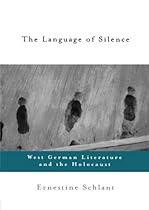The Language of Silence: West German Literature and the Holocaust

| Author | : | |
| Rating | : | 4.95 (867 Votes) |
| Asin | : | 0415922208 |
| Format Type | : | paperback |
| Number of Pages | : | 256 Pages |
| Publish Date | : | 2014-01-16 |
| Language | : | English |
DESCRIPTION:
"Changes in the telling of the Shoah in literature over time" according to Amazon Customer. The cover of THE LANGUAGE OF SILENCE tells the story. It is a memorial wall at a Grunewald, Germany, train station. The solid wall surrounds cut out forms of people looking as if they are the ones at the front of the line ready to board the trains. But there are no actual people. A Customer said If you are serious. I've read most of the novels in Dr. Schlant's book. Yet when I turned the last page of LANGUAGE, I knew that one of my next projects will have to include re-reading them.She rightly isolates the lone voices who dared speak up from 19If you are serious A Customer I've read most of the novels in Dr. Schlant's book. Yet when I turned the last page of LANGUAGE, I knew that one of my next projects will have to include re-reading them.She rightly isolates the lone voices who dared speak up from 1945 - 1960 or so, especially Karl Jaspers. Perh. 5 - 1960 or so, especially Karl Jaspers. Perh. literature as the seismograph of a people's unconscious At a recent book party for Ernestine Schlant (a.k.a. Mrs. Bill Bradley), I was particularly struck with Ms. Schlant's statement that "literature is the seismograph of a people's unconscious".Ms. Schlant and I both grew up in Germany. She was nine years old at the end of WWII, I
Schlant is the wife of presidential hopeful Bill Bradley.Ed.Gene Shaw, NYP.-Gene Shaw, NYPLCopyright 1999 Reed Business Information, Inc. . A chapter on speeches and controversy is especially good in discussing not only the written word but also the causes, development, understanding, and psychological repression of the reality of the Holocaust. She discusses the Holocaust as a total war against the Jews and the writings of the period as a literature of silence, evasion, and blindness. An excellent study; highly recommended for German and Jewish studies collections. Bll, Grass, Koeppen, Kluge, Schlink, and Sebald are some of the authors discussed. Schlant gives novels about fathers (vaterliteratur) written between 1975 and 1981 a separate chapter, and Ortheils A Farewell to
Learned and exacting, Schlant's study makes an important contribution to our understanding of postwar German culture.. Exploring postwar literature as the barometer of Germany's unconsciously held values as well as of its professed conscience, Ernestine Schlant demonstrates that the confrontation with the Holocaust has shifted over the decades from repression, circumvention, and omission to an open acknowledgement of the crimes. Yet even today a 'language of silence' remains since the victims and their suffering are still overlooked and ignored. Focusing on individual authors from Heinrich Boll to Gunther Grass, Hermann Lenz to Peter Schneider, The Language of Silence offers an analysis of West German literature as it tries to come to terms with the Holocaust and its impact on postwar West German society
